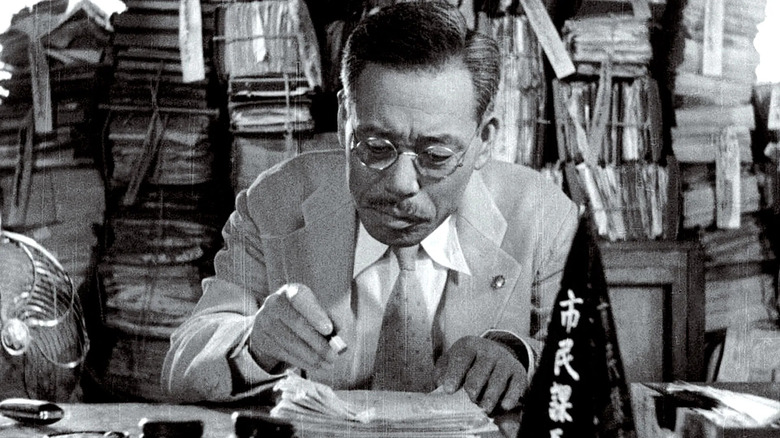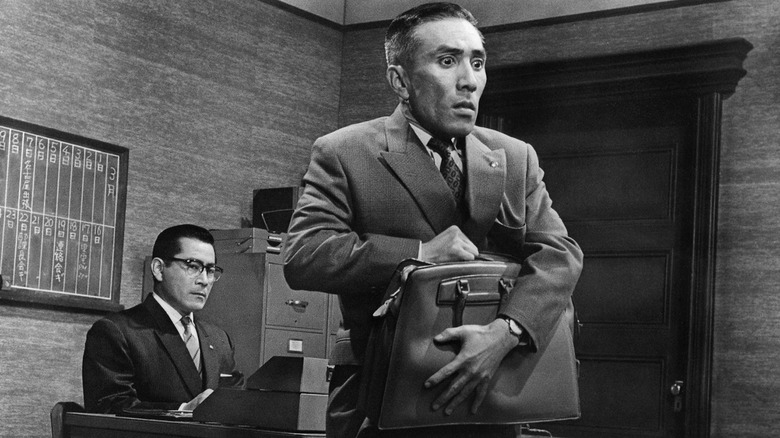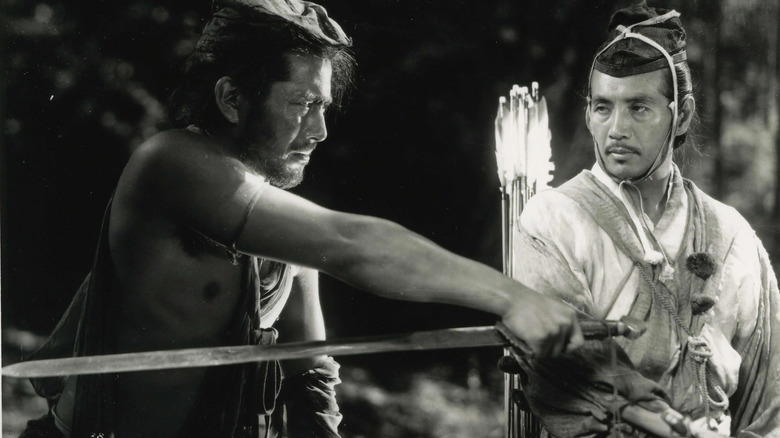
In a 1960 interview with Donald Richie, printed in the 2008 book "Akira Kurosawa: Interviews" edited by Bert Cardullo, Kurosawa admitted to a notable weakness he possessed as a filmmaker: he didn't make movies about women. Looking over the master's filmography reveals scant few notable female characters, and none occupying lead roles. Even "Ran," his 1985 adaptation of Shakespeare's "King Lear" gender-swapped the play's three central sisters into brothers. Kurosawa, it seems, was more interested in -- or simply only capable of discussing -- the foibles and weaknesses of men and male-kind.
Kurosawa'a moment of introspection came during a conversation about the filmmaker Kenji Mizoguchi. Kurosawa, Mizoguchi, and Yasujiro Ozu, between them, represent one of the greatest waves of cinema the world has ever seen, sometimes called the Golden Age of Japanese cinema by critics. The latter two filmmakers frequently made films about women and the middle class. Mizoguchi in particular often told operatic tales of fallen women, including "Osaka Elegy," "The Tale of Oharu," and "Street of Shame." Kurosawa was comparatively theatrical, making multiple samurai epics and the occasional action film. Kurosawa mused about how "people" -- he doesn't mention who -- often compare his work to Mizoguchi, leading to his self-realization. He said:
"People always say that his style is purely Japanese and that mine is foreign. I just don't understand that. [...] It might have something to do with what we make pictures about. His central figures are always women, aren't they? And the world he describes, women, merchants, the middle-class, isn't my world at all. Women simply aren't my specialty."
Where His Interests Lie

This led to a realization that Kurosawa really, really likes Mizoguchi. In fact, he's a favorite. "It might even be nostalgia," he said. "After all, I am Japanese." If, as the "people" say, Mizoguchi makes films that are "more Japanese" than Kurosawa's, then surely Kurosawa would like them. It was then that the director realized what was going on. It was the critics. The critics made him doubt his own work.
The relationship between critics and artists is, of course, fraught. An artist can pour their heart and soul into their work, only to hear a critical body dismiss it. Even if a review isn't necessarily critical of a work, critics can often see themes and motifs in a film that a writer or director didn't intend. Indeed, such insights are why critics are valuable to the culture at large: they can take sociological stock of what movies are being made and analyze their messages as they pertain to humanity's current epoch. Artists, meanwhile, often have to seethe when their intended point goes unnoticed or is dismissed.
That might lead someone like Kurosawa to outwardly hate the entire profession. Which he kind of did. He went on to say that he was unfairly judged and often misinterpreted, both inside and outside of Japan. In his words:
"That is what makes me so angry about the critics. Of course, they don't know anything -- in Japan or elsewhere for all I know. At least, I haven't read one foreign review of anything I've done which hasn't read false meanings into it. But the Japanese critics go on and on about how Western I am. And mainly just because I do my own cutting and happen to prefer a fast tempo and am really interested in people."
Artless Simplicity

Kurosawa then began to correct what critics have said about him, especially the assertion that his films read as "Western" to many critics. Kurosawa, a Japanese man, of course never endeavored to make his films feel any more or less Japanese than his peers. He merely had his taste and abided by it. He also realized -- slipping on a critical hat -- that the reason critics think his films aren't reflective of the national aesthetic is because he finds so many Japanese films to be incredibly boring. He said:
"That's the thing about most Japanese films — they don't really give a damn about people. Then when they get done they call it 'artless simplicity' and terribly Japanese -- well, that certainly isn't my way. And, of course, that is why they call me Western. That, come to think of it, is why I don't like period films, at least not the ordinary ones."
The director didn't mention which films he meant specifically, but he went on to maintain that Japanese movies are shallow. Indeed, he felt that all Japanese culture was experiencing a pervasive shallowness that was reflected in its movies. He noted that international cinema was far more interesting, saying:
"People abroad seem to like Japanese films, but I wouldn't count on it. Most Japanese films lack any real depth -- all Japanese culture has this thinness. Even the poorest programmers from abroad often have depths we just don't approach."
Whether or not Kurosawa was correct is, of course, a matter of critical debate. It would also have been nice to know which particular films from 1960 impressed Kurosawa. It was an impressive year after all, providing "Psycho," "L'Avventura," "Breathless," "La Dolce Vita" and "The Virgin Spring."
Read this next: 15 Best Movies Of The 1960s, Ranked
The post Akira Kurosawa Had Some Strong Opinions About Critics And Criticism appeared first on /Film.
0 Comments